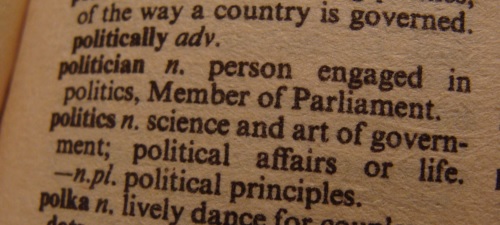The rise of neo-Nazi white nationalism in the United States behind its mask, the self-ascribed label 'Alt-Right', exposes a problem that needs to be addressed. When the words we use to describe and define things in politics are obscured or blurred it leaves us vulnerable.
Words matter. They are the medium for communication and even our own thoughts and ideas. When we lose clarity in the definitions of words, we lose the medium for expressing these ideas in the ways that can bring us together in shared understanding, or defining for ourselves what something is and how it might be championed, improved or opposed.
The words people use in politics, to name their parties or their belief systems, can inform or deceive. And it is the norm in politics that these words are heard mostly in an adversarial context, as opponents seek to label and discredit one another. But the words of politics describe discrete positions and it is important that people know what each of them represents.
There-in lies the danger of the rise of the self-proclaimed 'Alt-Right'. When white nationalism tries to hide behind the term 'Alt', it is both a deception and an attack upon the language of progress and reform. It allows them to obscure their true nature while attempting to co-opt the language, and therefore identity and perhaps support, of well-meaning reformers and anti-establishment movements.
This game is not newly invented by them. It has been the primary avenue of conservatism for centuries. As political movements reform themselves, the adherents who stick to the old unreformed tenets find themselves caught in the gravity of conservatism.
For instance, the term liberalism has undergone a long series of changes. As its adherents' understanding of how best to achieve individual liberty has evolved, so to has liberalism undergone changes. But the old ideas don't go away.
And conservatism never misses an opportunity. It consumes these ideas and assimilates them, finding ways to fit parts of these ideologies into its own thinking to convey its own purposes - to protect its system of tradition, hierarchy and moral order.
From the elitist constitutional order of the old bourgeois liberalism, to the free markets of classical liberalism, conservatism has found a home in the liberal parties that didn't reform themselves or conservative parties have taken up the ideas as they have been abandoned by the liberals who did reform.
While the determined consumption and repackaging of liberalism has been much commented on, the same process, happening to democratic movements, has been given much less attention. But it is just as real and just as disconcerting.
Amongst the revolutionaries of 1848, there were democrats as well as liberals. In that broad opposition movement, the failure of the liberal part of was clearly pointed out by Marx and Engels. The bourgeois order was the liberal folly that allowed their movement to be absorbed by the conservative establishment.
The democrats were not immune from folly. Their own folly was nationalism. Their leaders, like Giuseppe Mazzini, looked to nationalism as a medium to unite the people around their common heritage and arose them to protect their interests.
But efforts to achieve popular liberation and sovereignty ended up taking a back seat to petty rivalries over 'national' claims to lands and borders - driving rifts between the Germans and Czechs and Polish; saw the Hungarians, who were fighting to end domination by the Austrians, themselves fought by Romanians and Croatians.
The sectarian ideologies reared their menacing heads. Militarism embedded within the conservative establishment, particularly in Germany, wielded nationalism in the forging of nation-states with grand armies as the martial power in a great game - a competition between nations for self-interested domination.
For conservatism, the bourgeois order provided the administrative tools and nationalism provided the means to shape the popular identity. The follies of liberals and democrats, in quests for power and order, had in the end simply fed the conservative establishment with palatable ideas for assimilation.
This pattern on the part of conservatism has not ceased. Their offshoots in national populism and liberal conservatism, and those movements containing both - like the co-opted Republican Party in the United States - continue to play these language games with an eye for opportunity.
Progressives of all stripes, liberal or democrat, need to be wary of this. They need to take great care over their words and ideas, and never be willing to simply give up our words - and everything that comes with them - to conservatism.
American conservatism has co-opted the centrist concept of the republic. European conservatism has co-opted the liberal concept of individual liberty. The far-right everywhere co-opted the democratic-socialist concept of social justice. Now, white nationalist sectarianism wants to present itself as 'the alternative'.
But, as with parties like UKIP and Front National, these parties of the far-right pitching themselves as 'liberators' are really the ultra-establishment forces, disguising themselves in the garments of the anti-establishment movements of the turn of the millennium. They claim words like 'Alt' and pitch themselves as the conservative rebel to the liberal-socialist tyrant because it suits them in this moment.
Progressives cannot keep giving ground. They cannot lightly allow words to be taken as new disguises or fresh ammunition for conservative movements - movements that promise liberation but will deliver only the conservative triumph: tradition over reason, moral order over sound ethics, hierarchy over equality.
References
Mike Rapport's '1848: Year of Revolution'; Abacus; 2008. [Buy Now


No comments:
Post a Comment